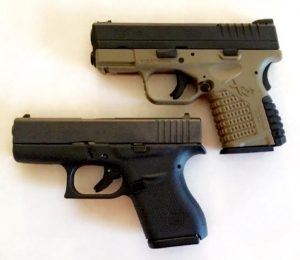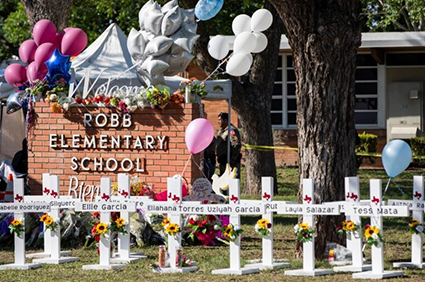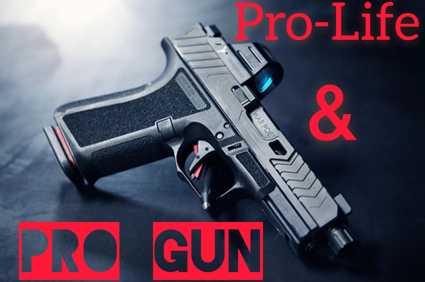Question
Hey Tim, should a Christian conceal carry? Aren’t Christians supposed to love criminals — not kill them?
– Darrell
Tim’s Response
Thank you for your question, Darrell! Although I do not have a concealed carry permit myself, I have grappled with similar questions for most of my life. This is the case because I have been training and competing as a martial artist since I was twelve years old. This has engrained a deep sense of duty to defend those who cannot defend themselves. I have also had to use these “self-defense skills” a handful of times over the past three decades.
With that said, I always wondered about that whole “turn the other cheek” thing. Was I, as a Christian, who was also a walking weapon, in violation of the Law of Christ? Is it sinful to use jujitsu, Karate, or Krav Maga to stop a bad guy from kidnapping, raping, or murdering a toddler? Or, should I just allow them to abuse the toddler and then “turn the other cheek” (so-to-speak) and offer them another toddler to molest?
Now, it is one thing to be trained as a “walking weapon,” but what about carrying  a concealed weapon like a Glock 43 or a Springfield XD-S? Surely Christians should not carry weapons like these, right?
a concealed weapon like a Glock 43 or a Springfield XD-S? Surely Christians should not carry weapons like these, right?
I must admit that there is much debate within the church regarding this issue and that not all Christians agree. One will find all kinds of people behind the doors of the church from complete pacifists to those who possess more of an arsenal than some small countries! With that said, let me explain where I currently stand by examining several key passages of Scripture.
Confusing Bible Verses
First, consider the passage referenced above:
“But I tell you, do not resist an evil person, If anyone slaps you on the right cheek, turn to them the other cheek also” (Matthew 5:39).
This is probably the most popular verse used to justify pacifism. However, it is not necessary to jump to that extreme for several reasons. First of all, we must make sure to take this verse in context with the entire passage. The fifth chapter of Matthew (where this verse is found) records Jesus’ famous Sermon on the Mount. One main point Jesus is trying to convey is that His followers ought to go beyond the letter of Israel’s law in the name of love.
Jesus teaches that when we are insulted or abused, we ought to go an “extra mile” (not an infinite amount of miles) for someone who is taking advantage of us. Moreover, we are told to pray for those who persecute us and to actually love our enemies! Gotquestions.org says Jesus’ teachings here can be summed up by stating, “we need to be pure inside and out and should be as accommodating as possible for the sake of a lost world.”
They go on to say:
To “turn the other cheek,” does not imply pacifism, nor does it mean we place ourselves or others in mortal danger. Like the principle of the eye for an eye and tooth for a tooth in Matthew 5:38, turning the other cheek refers to personal retaliation, not criminal offenses or acts of military aggression. Clearly, Jesus did not mean to negate all God’s laws and injunctions protecting us against violent crime or invading armies. Rather, Jesus is speaking here of the principle of non-retaliation. . .
So, it is not clear that we should infer from this verse that Jesus would disapprove of carrying a concealed weapon or using it in some extreme situations. This is especially evident when considering what Jesus said to His disciples:
“But now let the one who has a moneybag take it, and likewise a knapsack. And let the one who has no sword sell his cloak and buy one” (Luke 22:36).
At face value, one can use this verse to justify carrying a weapon. With that said, however, one trained in hermeneutics realizes that not all verses should be interpreted at face-value. This verse, however, seems to be a prime candidate of one that should be taken literally because we know that Jesus’ disciples did, in fact, carry blades of some sort as Peter used his edged weapon to slice the ear off of the high priest’s servant who was trying to arrest Jesus.
However, this is where things get confusing as Jesus scolds Peter for using his weapon and commands him to “Put your sword back into its sheath; shall I not drink the cup that the Father has given me?” (John 18:11)
From this verse we can infer that Jesus not only commanded the carrying of weapons for self-defense purposes (as Luke 22:36 reads), but he was also aware that Peter was “packing heat.” It seems quite ad hoc to suggest that Jesus was being figurative about carrying swords, but his disciples mistakenly took him literally. Modern readers do this quite often by reading ancient texts through modern lenses, but Peter and company would have been in a position to know if Jesus was speaking figuratively or not. Moreover, are we really to believe that Jesus was not aware of the swords his disciples were carrying (and intentionally hiding) until the moment Peter drew his weapon? I find that hard to take seriously!
Also, note that Jesus does not tell Peter to drop his sword and never touch it again. No, Jesus tells Peter to put his sword “back into its sheath.” If a Sheriff tells his deputy to holster his firearm, he means put it away but keep it on your person. The Sheriff is not implying that the deputy ought to get rid of his weapon forever. We can infer from this that Jesus condoned Peter’s further carrying of the sword.
One might object and state that Matthew records Jesus telling Peter to put his weapon away, and follows that with: “Those who use the sword will die by the sword” (Matt 26:52 NLT). The Greek literally reads “For all those taking a sword will die by a sword.” With this in mind, surely this verse is not to be taken literally! If that were the case, then Jesus was wrong. I am positive there have been at least a couple of Samurais who “lived by the sword,” but who died of old age. Moreover, if Peter’s use of the sword meant that he would have died by the sword, then he probably should have kept using it given that he was eventually executed and crucified upside-down. Although I would not like either manner of execution, it seems death by sword would have been a better option for Peter.
It seems to me that Jesus is essentially telling Peter, “Put your sword away, bro! If you use it now, you will die now!” That certainly seems that it would have been the case. In fact, it seems utterly miraculous that Peter was not killed on the spot! Surely if he would have continued his fight in the garden, the Roman “commandoes” would have terminated him within seconds.
Given these reasons, I am persuaded to think that Jesus commanded his disciples to “pack some heat” as there could be some situations in which they find themselves in which they might need to defend their lives. I also believe that Jesus did rebuke Peter and commanded him to “sheath his sword” in the Garden of Gethsemane because that was not a situation in which they should fight. Jesus explains why immediately following the incident in Matt 26:54, “But how then shall the Scriptures be fulfilled, that it must be so?”
This implied counterfactual is equivalent to Jesus stating the following proposition to Peter: “If you fight off those coming to take me to the Cross, then the Scriptures would not be fulfilled (and salvation will not be secured). So stop it!”
It seems Jesus commands Peter to “sheath his sword” for two reasons: First, if Peter would have continued to fight in the garden, then he would have died in the garden. Second, even if Peter were successful in saving the life of Jesus, then not only would the Scriptures fail to be fulfilled, but the salvation of humanity would not be secured.
Jesus Fights for Others
It is vital to examine the character of Jesus by looking at other examples of his life and ministry. Consider how Jesus defended the life of the woman caught in the act of adultery (John 8). Although the “inspiration” regarding this text is debated amongst Bible scholars, I believe this passage is historical (inspiration and historicity are two different subjects).
Jesus was able to save this woman’s life without resorting to violence by reasoning with them and saying, “He that is without sin among you, let him first cast a stone at her.” But what do you think would have happened if the Pharisees would not have all dropped their stones? It is a rational inference to conclude that Jesus would have fought to save her life — I think Jesus would have put the Jew in Jujitsu! 😉
Are we really to believe that if the Pharisees would have started smashing this woman’s skull with rocks, that Jesus would have just stood and watched? This does not sound like the Jesus we know from the rest of the gospels.
Moreover, consider the example of self-defense that Jesus provided in the same chapter of John 8. In the 59th verse it states that after Jesus equated Himself with God — “Before Abraham was, I am” — the Pharisees reacted by picking up stones to kill him. However, Jesus did not wait around to get killed; rather, he got the heck outta Dodge, ran away, and hid from them!
Are we to think that Jesus only condones the flight response, but not the fight response when it comes to self-defense? What about when it comes to protecting those who are in no position to flee? The question is raised: Why does Jesus defend His life by fleeing in this instance, but walks towards the Roman soldiers in the Garden of Gethsemane when he was about to be arrested and taken to his death?
It was all about the timing and the Cross; which was also why Peter was told to “sheath his sword” in that particular circumstance.
Properly Basic Beliefs
Furthermore, and apart from Scripture, it just seems properly basic that if one is in a position to defend their wife or children from the attack of a mountain lion, then a good husband and father would fight the mountain lion. In fact, a good husband and father is willing to kill the mountain lion if need be — even if the man is an animal lover and does not want to kill the wild animal.
Not only is it good to stop the violent attack against a man’s family, but he should also be willing to die in the process of fighting for the safety of his loved ones. Jesus seems to agree: “Greater love has no one than this: to lay down one’s life for one’s friends” (John 15:13). If this is the case when it comes to an attack of a wild animal, why would it no longer be acceptable to defend your loved ones from the attack of an evil man acting like a wild animal?
Consider the words of theologians J.P. Moreland and Norman Geisler:
“…to permit murder when one could have prevented it is morally wrong. To allow a rape when one could have hindered it is an evil. To watch an act of cruelty to children without trying to intervene is morally inexcusable. In brief, not resisting evil is an evil of omission, and an evil of omission can be just as evil as an evil of commission. Any man who refuses to protect his wife and children against a violent intruder fails them morally.”
Back to the Bible
To make the point even stronger, consider this: God gives authority to the government to suppress evil (Deut 17:1-7). Government officials in positions of authority, from the President of the United States to law enforcement officers, are called to fight evil (1 Pet 2:13, 14). Capital punishment is allowed by God when approved of by the government (Romans 13:1-7). Thus, it is up to the government to decide who is legally justified in “bearing the sword.”
As far as the United States is concerned, the founding fathers of our government specifically wrote our constitution making it clear that American citizens are a part of the government and that we have the right to possess weapons. According to our laws, Americans have the right to protect our lives and to protect others. Therefore, since the American government allows concealed carry (and the use of the weapon in rare and certain circumstances), and the Bible allows the government to make these decisions, then Americans have the Biblical authority to carry weapons and protect ourselves, our families, and those who cannot protect themselves from evil. We can demonstrate this via deductive conclusions:
1- If God gives governments the right to bear the sword, then it is up to the government to decide who is legally justified in “bearing the sword.”
2- God gives governments the right to “bear the sword” [God gives authority to the government to suppress evil (Deuteronomy 17:1-7), government officials in positions of authority are called to fight evil (1 Peter 2:13, 14), and capital punishment is allowed by God when approved of by government (Romans 13:1-7).]
3- Therefore, it is up to the government to decide who is legally justified in “bearing the sword.”
4- The US Constitution allows Americans to possess weapons and US law allows citizens to carry weapons and use deadly force in certain situations.
5- Thus, Americans have Biblical grounds for carrying weapons and using deadly force in certain situations.
Worded otherwise:
1- If God gives governments the right to bear the sword, then governments have the right to declare what persons carry the sword.
2- God gives governments the right to bear the sword (Deut 17:1-7; 1 Pet 2:13, 14; Rom 13:1-7).
3- Therefore, governments have the right to declare what persons carry the sword.
4- The United States of America has declared that citizens have the right to carry the sword.
5- Therefore, it is biblically acceptable for citizens of the United States of America to carry the sword.
Conclusion
So, should a Christian carry a concealed weapon? Scripture seems to affirm the right to carry a legal weapon. A Christ follower who has love in his heart for everyone from his neighbor to his enemy, should employ sound biblical judgment and exercise restraint in any situation where a weapon is involved. We are justified to fight for the lives of others because we are commanded to love them as we love ourselves, it is also inferred from scripture that it is good to protect our own lives if we are being threatened in a severe manner.
I am not ready to die on this hill and fully admit that I could be wrong. However, as the Biblical scholar and martial artist, Mike Licona told me, “I do not see any clear biblical texts prohibiting self-defense in life and death situations (I do see many in the Old Testament condoning self-defense).” Moreover, even Jesus offered forms of self-defense before it was time to go to the Cross. Thus, I am persuaded that it is probably acceptable to “love thy neighbor and pack thy heat.”
Bottom line: A Christian should not carry a concealed weapon unless they truly love all people — from their neighbors to their enemies (Matt 5:44; Mark 12:31). One should only be willing to pull the trigger if it is the most loving thing to do in that specific (and extreme) situation. Although Paul implies that it is not always possible to live at peace with everyone, he admonishes Christians to do everything in our power to “coexist” and live peaceably with all (Romans 12:18). Pulling the trigger should be the last thing anyone should ever do, and it ought to be something that, although they are willing to do, they hope and pray that they never, ever, have to do!
Stay reasonable (Isaiah 1:18),
Tim Stratton










